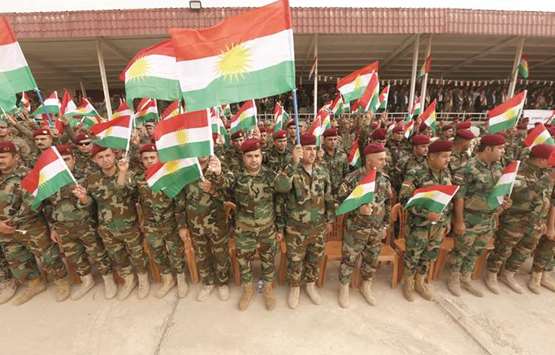Visitors to Kirkuk in northern Iraq are greeted by an imposing statue of a Kurdish Peshmerga fighter with a gun slung over his shoulder, a reminder of tensions building in the hotly-contested city ahead of a referendum on Kurdish independence.
Erected in July, the statue has come to symbolise how the Kurds want to cement their hold on oil-rich Kirkuk and other parts of the region by holding next Monday’s vote.
Peshmerga, which means those who confront death, are the military forces of the autonomous region of Iraqi Kurdistan.
The referendum is risky, especially in Kirkuk, a multi-ethnic city. The Kurdistan region produces around 600,000 barrels per day (bpd) of oil.
The central government in Baghdad, Iraq’s neighbours and Western powers fear the vote could divide the country and spark a wider regional conflict, after Arabs and Kurds co-operated to dislodge Islamic State from its stronghold in Mosul.
Already at least one Kurd has been killed in pre-referendum clashes, and security checkpoints have been erected across the city to prevent further violence.
But the Kurds say they are determined to go ahead with the vote, which, though non-binding, could trigger the process of separation in a country already divided along sectarian and ethnic lines.
Iran, Turkey, the United States and Western allies oppose the vote.
Some non-Kurds fear Baghdad will attempt to regain control of Kirkuk and send in militias (PMU), also known as the Hashid al-Shaabi, stationed just outside the province.
“I fear the Hashid will come and fighting will start in Kirkuk,” said Nazim Mohamed, an Arab from Mosul who fled to Kirkuk when the northern city was overrun by Islamic State.
The militias fear an independent Kurdistan would split Iraq, giving them and Tehran less influence.
Kirkuk, populated by Kurds, Arabs, Turkmen, Christians and other minorities, is one of 15 ethnically mixed areas in northern Iraq that will participate in the referendum.
They are claimed by both the central government in Baghdad and the Kurdistan Regional Government (KRG). A decision by KRG President Massoud Barzani to include these so-called disputed territories in the plebiscite was widely interpreted as a unilateral move to consolidate Kurdish control.
Critics say Kurdish intentions were already clear before the referendum was announced.
Peshmerga fighters seized Kirkuk in 2014, after fleeing Iraqi security forces left its oil fields vulnerable to Islamic State militants who had just swept across northern Iraq.
The statue is dedicated to the Peshmerga and is designed to represent the appreciation of the people of Kirkuk.

Iraqi Kurdish peshmergas take part in a gathering to urge people to vote in the upcoming independence referendum in Arbil, yesterday.
